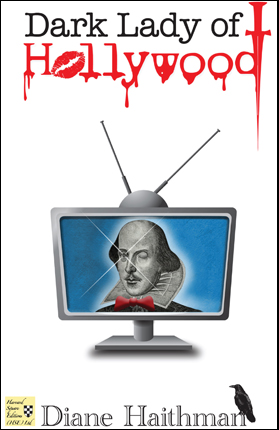Detroit native Diane Haithman reads from her novel “Dark Lady of Hollywood” at Barnes & Noble, 3 p.m. Sun. 6800 Orchard Lake, West Bloomfield Township, Michigan. (248) 626-6804. From The Detroit News
___________
Reviewed by Jill Allen, Foreword Reviews
All the world’s a stage when an actress and a terminally ill TV executive meet in this biting comedy.
It takes a special kind of talent to simultaneously skewer Hollywood and Shakespeare while writing a thought-provoking novel, and Dark Lady of Hollywood proves Diane Haithman has this genius. As a former arts and entertainment writer for the Los Angeles Times, Haithman’s book explores themes of the ephemeral nature of show business, a human desire to connect, and what really matters in life, while causing chuckles at the same time.
As the story opens, TV executive Ken Harrison’s life and career slide downhill fast. Demoted from his job due to the fickle whims of television ratings, he struggles to find meaning in his life while trying not to think about the aggressive form of cancer that he has which other people seem to think has taken over his life. Fate brings him together with Ophelia Lomond, a biracial thirty-two-year-old wannabe actress who finds herself in a rut. Shakespeare aficionado Ken quickly determines that Ophelia will be to him what the Dark Lady of the Sonnets was to the Bard: his inspiration. However, Ken and Ophelia have decidedly different ideas of what being a muse involves.
In a brilliant coup, the author allows Ken and Ophelia to narrate alternating chapters from the first-person point of view so that the reader gets to know each intimately. In this way, Ken becomes more than a one-dimensional cancer survivor, and Ophelia becomes more than just a biracial beauty.
Both Ophelia and Ken have wry, wise viewpoints on the entertainment industry, which will keep readers laughing along. Additionally, the pair is shrewd and intelligent. They play off each other well, making it easy to root for them and their budding relationship. One can empathize with why Ophelia would change her name and pretend she is from an imaginary island, because the author astutely shows the hoops anyone has to go through in hopes of landing the role of their dreams. It is refreshing to see someone like Ken, who, in the face of terminal illness, goes about stubbornly living his life, even when everyone around him says he’s going to die.
Furthermore, the author gently satirizes Los Angeles and the industry while making the Bard of Avon drolly relevant. She begins every chapter with an apt quote from a Shakespeare play. Anyone who appreciates comedy and either loves or disdains Tinseltown will adore this breezy, biting book.








